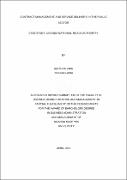Contract management and service delivery in the public sector
Abstract
Contract management is an important activity in public procurement, especially when executing projects fostering community development while aiming at value for money. On the contrary, reports from the 2nd Public Procurement Integrity Survey by the PPDA have shown that public funds have been wasted because of poor contract management which hinders achievement of value for money. Hence, despite its importance, limited studies have been conducted to exhaust the problem. The reviewed studies concentrated much on the identification of the factors that cause poor performance of procurement contracts and contract management, in general, without assessing how procurement contracts are formulated and implemented while contributing to the achievement of value for money.
Thus, this study aimed at assessing the effectiveness of procurement contracts management towards achieving service delivery in procurement of public works. Specifically, the study intended to describe the nature of procurement contracts for works, to evaluate the adequacy of terms and conditions of formulated procurement contracts for works as required by PPDA 2003, examine the effectiveness of procurement contracts for works implementation in order to achieve value for money and determine the contribution of effective contract management during procurement of works on the achievement of service delivery. The study was undertaken by using a case study design whereby purposive and random sampling techniques were used to pick a sample of 59 respondents while questionnaires, were used to collect data. Data was analysed through applying qualitative techniques that involved the use of narration approaches, while quantitative SPSS techniques involved utilisation of descriptive statistics and frequencies techniques. Findings showed that contracts need to contain necessary required terms and conditions to guarantee service delivery and it was established that contracts need to be effectively executed and managed adequately basing on the need for the contract.
Also, it was determined that management of contracts resulted into timely delivery of contracts, quality and costs were minimised. However, in some aspects of the research questionnaire, there were signs of ineffectiveness that include variations, inadequate use of time allocated to specific contracts and extensions of time which jeopardised the achievement of value for money.
Therefore, it was concluded that effective management of procurement contracts was essential for achievement of value for money, timeliness, and quality and basing on the reviewed responses. The studied case (UNRA) has achieved service delivery above average scale by considering quantitative responses. However, basing on the weaknesses found, it is recommended that UNRA should enhance supervision, avoid unnecessary variation, prepare quality plans and perform defects inspection for completed works during specific allocated period in order to enhance service delivery in a timely, quality and value for money manner.


